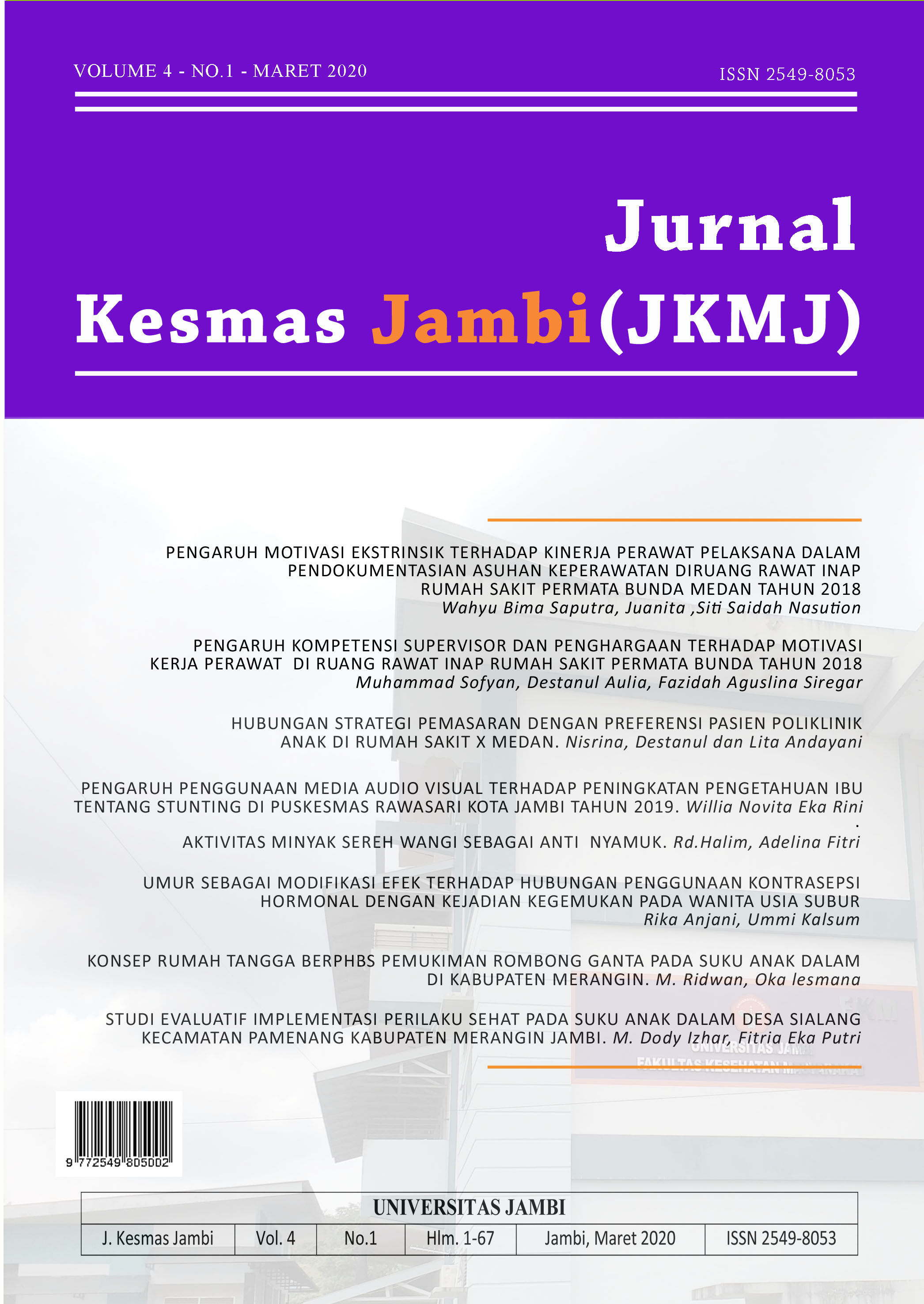Konsep Rumah Tangga BerPHBS Pemukiman Rombong Ganta Pada Suku Anak Dalam Di Kabupaten Merangin
DOI:
https://doi.org/10.22437/jkmj.v4i1.8986Abstract
Budaya melangun warga SAD Jambi pada kesehariannya menjadikan mereka sulit mendapatkan hak-hak sebagai warga Negara. Pemerintah sudah memberikan rumah tetapi akhirnya di tinggal atau di jual. Tujuan penelitian untuk mengembangkan konsep Perilaku hidup bersih dan sehat yang di butuhkan dan dapat diterapkan ketika menghuni rumah sehingga perpindahan dari pemikiman sudung ke pemukiman menetap memiliki ketrampilan dalam menjaga kebersihan. Penelitian kualitatif dengan design studi kasus. Metode pengambilan sampel secara purposive sampling, pengambilan data dengan wawancara mendalam, dan FGD. Analisis Data menggunakan pendekatan content analysis.Warga SAD pada awalnya dari pemukian berpindah (Sudung) ketika menghuni rumah tidak serta merta mampu menyesuaikan sebagaimana fungsi rumah yang sebenarnya. kondisi lingkungan pemukian tidak terawat, perilaku hidup bersih misalnya mencuci tangan pakai sabun. mencuci pakaian. Mandi, memotong kuku. dan memaksakan makanan ternyata belum sepenuhnya masyarakat SAD paham dan mampu melakukan. Dari hasil penelitian ini ketika di berikan rumah maka warga SAD harus di bekali dengan pemahaman tentang kebersihan diri ,dan lingkungan. Penyelesaian Masalah Kesehatan Masyarakat SAD Konsep PHBS bagi warga SAD dapat dilakukan untuk mempercapat perubahan perilaku. Pola pendampingan dengan ‘Live in’ atau tinggal bersama mereka lebih lama dan memberikan contoh sebanyak-banyak akan mempercepat perubahan perilaku warga Suku anak Dalam (SAD)
Kata Kunci : Pemberdayaan, SAD, PHBS SAD
Downloads
Downloads
Published
Versions
- 2020-03-27 (1)
- 2020-03-27 (1)
Issue
Section
License

This work is licensed under a Creative Commons Attribution 4.0 International License.
Proposed Creative Commons Copyright Notices
1. Proposed Policy for Journals That Offer Open Access
Authors who publish with this journal agree to the following terms:
- Authors retain copyright and grant the journal right of first publication with the work simultaneously licensed under a Creative Commons Attribution License that allows others to share the work with an acknowledgement of the work's authorship and initial publication in this journal.
- Authors are able to enter into separate, additional contractual arrangements for the non-exclusive distribution of the journal's published version of the work (e.g., post it to an institutional repository or publish it in a book), with an acknowledgement of its initial publication in this journal.
- Authors are permitted and encouraged to post their work online (e.g., in institutional repositories or on their website) prior to and during the submission process, as it can lead to productive exchanges, as well as earlier and greater citation of published work (See The Effect of Open Access).
Proposed Policy for Journals That Offer Delayed Open Access
Authors who publish with this journal agree to the following terms:
- Authors retain copyright and grant the journal right of first publication, with the work [SPECIFY PERIOD OF TIME] after publication simultaneously licensed under a Creative Commons Attribution License that allows others to share the work with an acknowledgement of the work's authorship and initial publication in this journal.
- Authors are able to enter into separate, additional contractual arrangements for the non-exclusive distribution of the journal's published version of the work (e.g., post it to an institutional repository or publish it in a book), with an acknowledgement of its initial publication in this journal.
- Authors are permitted and encouraged to post their work online (e.g., in institutional repositories or on their website) prior to and during the submission process, as it can lead to productive exchanges, as well as earlier and greater citation of published work (See The Effect of Open Access).



 p-ISSN :
p-ISSN :  e-ISSN :
e-ISSN : 


